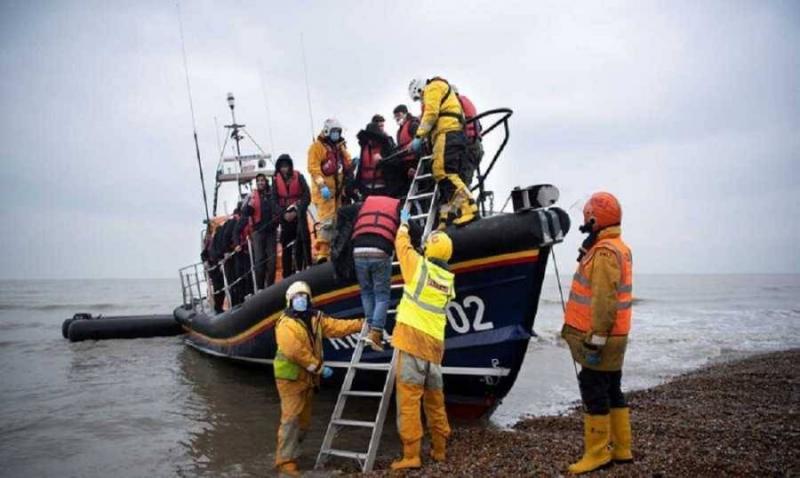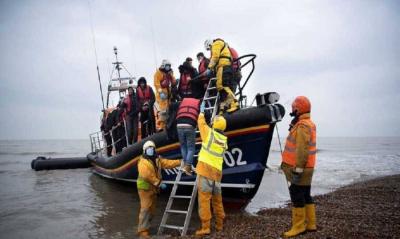European Commission President Ursula von der Leyen, accompanied by Cypriot President Nikos Christodoulides, did not visit Beirut recently to help the Lebanese get rid of the burden of displacement but to keep this specter away from the European continent through the Cypriot gateway. This visit came after Nicosia raised its voice against boats of irregular migrants seeking asylum and arriving by sea from Lebanon, and after Cyprus began taking measures to push Syrian refugees away from its territory through governmental decisions or by intercepting migrant boats and forcing them back to their departure points.
European statements, including von der Leyen's announcement that the EU will provide a financial aid package to Lebanon worth one billion euros for the period extending from this year until 2027, hint at the purpose of this assistance. The EU delegation in Lebanon was clear in the statement it distributed regarding von der Leyen's visit, indicating that the one billion euro aid includes support for the Lebanese Army and other security forces in the form of equipment and training to manage borders and combat smuggling.
According to military sources, the Army leadership has not yet received any details about this assistance, and no one has discussed a conditional grant with Army Commander General Joseph Aoun. The only information conveyed to him is that there is assistance within the European grant to support the Army, without any request for something in return from the military institution. However, many believe that any support for Lebanon, particularly for the military, aims to enhance the Army's capabilities to control land and/or sea borders, which means stopping the boats of Syrian refugees migrating across the Mediterranean to Europe through Cyprus. Notably, the decision to open the seas to Syrians and flood Europe with refugees does not lie with the Lebanese Army, as it is a national-political decision at the government level.
While some consider that the excuse for ignoring irregular Syrian sea migration has faded after Cyprus's recent measures supported by the EU, or because Lebanon cannot antagonize the international and especially European community, figures indicate that this option has not yet been utilized or exhausted. Although a few thousand irregular migrants may have disturbed the Cypriot island and the EU behind it, there are approximately two million Syrians in Lebanon, many of whom may attempt to migrate by sea if they do not face obstruction or prevention from Lebanese authorities. Furthermore, Syrian refugees pose an existential danger and a demographic threat in addition to the economic, financial, and security costs of displacement on infrastructure, and thus any sanctions, displeasure, or actions from European countries do not equate to the magnitude of the risks stemming from Syrian displacement.
### Numbers of Migrants
The United Nations High Commissioner for Refugees in Lebanon verified from January until April 17, 2024, 59 actual movements or attempts to enter, totaling 3,191 passengers, mostly Syrians, detailed as follows: 5 boat departures in January (278 passengers), 12 in February (606 passengers), 18 in March (1,016 passengers), and 24 in April up to the 17th (1,291 passengers).
In comparison, there were only 3 boat movements during the same period in 2023, amounting to 54 passengers, according to sources from the Commission. In 2023, the Commission verified 65 actual movements or attempts to escape by boat, totaling 3,927 passengers. 29 departures by boat carrying 1,692 passengers were intercepted or thwarted, while 33 boats carrying 2,126 passengers successfully reached their intended destinations (31 in Cyprus, 1 in Italy, and 1 in Libya). Additionally, 3 boats carrying 109 passengers were returned to Lebanon.
When compared to 2022, there was an 18.2% increase in confirmed boat departures or attempted departures from Lebanese shores that the Commission was able to verify in 2023; however, the number of passengers declined by 15.3% compared to 2022. As for the boat that Cyprus prevented from entering its territorial waters last April and was sent back to Lebanon, among over 224 passengers who disembarked in Tripoli in Northern Lebanon late on April 17, during the presence of UNHCR teams, the team identified 129 recognized refugees, and 123 of them were later released.
On the Lebanese side, the Lebanese Army, according to figures obtained by "Nidaa al-Watan," arrested 2,684 irregular migrants from 2017 to 2024, of whom 99% are Syrians (2,239 arrests at sea and 445 arrests on land).
Based on these figures, maritime migration from Lebanon to Mediterranean countries, especially Cyprus, remains limited, compared to the number of Syrians living in Lebanon, regardless of whether they are refugees, displaced persons, undocumented, or residents, in addition to Palestinian and Lebanese numbers who might venture into the seas, even irregularly, to reach what they consider a future economic and social safe haven for themselves and their families.
However, based on the state's failed experience in addressing the displacement issue for the past 13 years, those tracking the displacement situation since 2011 are concerned that irregular migration could become a lever of pressure on Lebanon through enticement or intimidation instead of being a Lebanese pressure card on Europe and the international community, much like the situation has been with all aspects of the displacement issue, including data.




